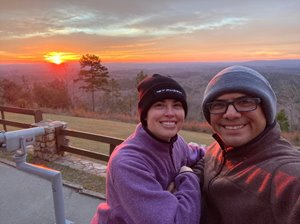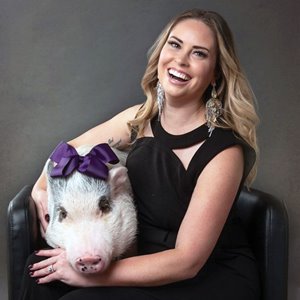 American Legion Auxiliary member Lindsay Gutierrez, a U.S. Air Force veteran, is originally from Oklahoma, and now lives in Georgia with her active-duty Air Force husband, Anthony, and many fur babies. She works as a congressional caseworker for federal veteran-related issues.
American Legion Auxiliary member Lindsay Gutierrez, a U.S. Air Force veteran, is originally from Oklahoma, and now lives in Georgia with her active-duty Air Force husband, Anthony, and many fur babies. She works as a congressional caseworker for federal veteran-related issues.
From her experiences both professionally and personally, Gutierrez created The SCAR Initiative. The mission is to highlight the various wounds we’ve all endured — through storytelling and how these stories illuminate the courage and empowerment of participants.
Can you tell us a little about yourself?
In my downtime, you can probably find me creating content for The SCAR Initiative, mudding with Anthony in our side-by-side, hiking, competing in pageants, cycling, traveling, reading, cuddling my potbelly pigs, writing articles for Freedom Sisters Magazine, or listening to true crime podcasts. Professionally speaking, I hold a Master of Arts in Human Relations from the University of Oklahoma and a Master of Social Work from Arizona State University. I work as a congressional caseworker for federal veteran-related issues. Fun fact: I was crowned Ms. Veteran America 2017, and this was a major catalyst into my advocacy for veterans post-military.
You are an Air Force veteran, and we thank you for your service! Is there anything you’d like to share about your time in the military?
My job in the Air Force was Security Forces and to most peoples’ surprise, it’s a career I wanted to be in. I served my entire enlistment at RAF Lakenheath, England and deployed to Djibouti and Qatar. I had some great temporary duty stations as well, but my favorite was going to Israel for a month to participate in a joint-nation exercise. Being in Security Forces provided some great comradery opportunities and many fun memories with the people I served with. I had some outstanding leaders who saw my potential and set me up for personal and professional success both in and out of the military. Post-separation from the military, I struggled to find employment, going almost three years without a career. It was through the military and outside experiences that I was able to find my “why” as a social advocate and recognized my service to others can extend beyond the uniform.
We are proud to have you as an ALA member! What does your membership mean to you?
Community, pride, and love for the men and women who have served to provide us the freedoms we often take for granted. Being an ALA member means being a servant-leader and offering care to veterans and their families through various programs and resources, so anyone needing a help up, not a handout, can turn to the ALA for that support.
What inspired you to create The SCAR Initiative?
The SCAR Initiative (TSI) was created one day as I was staring at one of my own physical scars located on my right elbow. Allow me to provide a quick back story: I love to road cycle, and over the summer I was out riding my bike when I took a nasty spill on the road. While I wasn’t seriously hurt, my ego was most impacted due to personal humiliation of an adult crashing their bike for no apparent reason. I ended up with a scraped elbow and shoulder and a nice imprint of my bike chain on my right leg.
Fast forward to a few months later: I have a tremendous keloid scar that now carries a fun story. This got me thinking of the many people I’ve encountered who have physical scars. We think to ourselves, I wonder how that happened? I’m a very inquisitive person, so it led me to wondering even more if people would be interested in telling how their physical scars occurred. I immediately took this thought a step further and thought, How many people would tell of their invisible, internal scars?
Mental health in America is a major discussion point and something we all have struggled with. As a veteran of the U.S. Air Force, I recognized early on in my military career how much veterans suffer in silence because being vulnerable is viewed as a sign of weakness. Personally, I’ve lost too many battle buddies to suicide, and it hurts to know if only we could have shared our story, would it have changed the outcome?
My goal with TSI is to help be a small catalyst in turning this systemic stereotype around, where vulnerability with our physical and invisible scars is seen as incredible strength and courage. Our scars connect humanity on many levels and telling of these stories helps to bring us closer.
Can you describe The SCAR Initiative?
The mission of The SCAR Initiative is to highlight the various wounds we’ve endured through storytelling and how these stories illuminate the courage and empowerment of participants.
What has it been like interviewing fellow veterans on such personal topics?
I’ve felt honored to have people share extremely personal stories with me. To open oneself up to that level of vulnerability takes immense courage which I have the utmost respect for. It’s life-changing to know people recognize the power of their story can help someone else in the world.
Have there been any topic shared with you that really hit you hard emotionally?
Each story is so different that they all hit me emotionally. While I may not have experienced what each person has gone through personally, I can empathize with many of the emotions on a humanistic level. Most people can relate to fear, worry, shame, anxiety, depression, hate, desperation, ugliness, and so many more negative feelings and emotions — but we can also connect to love, strength, courage, empowerment, joy, happiness, and all the positive aspects of healing.
 What do you hope people take away from sharing their stories with you?
What do you hope people take away from sharing their stories with you?
For those sharing and watching the interviews, I hope they experience healing, connection, inspiration, empowerment, and a new sense of hope for their future.
From your experiences, do you feel it’s therapeutic for people to share about their scars, both visible and invisible?
No doubt. The people I’ve interviewed have told me, both on camera and off, how therapeutic it was for them to talk about their scar. Viewers can sense the personal growth from every person’s story. Many interviewees found it surprisingly cathartic to release many emotions that had been built up over time and to reclaim power over something that once controlled them. I can tell from the conversations that sharing stories, no matter how big or small they may be, all provide an opportunity to release negativity and foster positivity through their healing journey.
Why do you feel it’s important to use storytelling to connect people?
In general, stories capture the essence of who we are at our very core. Everyone has a distinctive scar story, and yet each individual story dives into how scars can connect humanity in raw, yet strikingly honest, powerful, and beautiful ways. Exposing our scars can be extremely vulnerable, and the focus of this initiative invites people to share their stories as a way to not only promote healing for themselves, but to open the door for others to explore their own healing journey. The participants’ narratives represent why storytelling is such a dynamic way to inspire meaningful change; our shared connections and experiences foster a sense of purpose, empathy, and influence in this chaotic, challenging life.
Sometimes, members of the military don’t always find it easy to talk about their experiences. Do you have any tips for ALA members on how they can be supportive of those we serve to share their stories?
Meet people where they are in life. Simply put, don’t force people to share something they aren’t ready to, and be there to support them wherever they are in their journey. When people are ready to share, they will. Sharing stories must be autonomous and not a forced situation. Just being there for someone can be enough and letting them know you’re there for the can be a tremendous start in fostering trust between ALA members and their community. What we want to avoid saying are the phrases, “I’m here if you want to talk” and the all-too-common-but-with-good-intention, “I understand how you feel/what you’re going through.” Nobody knows what someone is really experiencing, and it takes away from the focus of that person’s trauma. Don’t try to find the silver lining in a sad situation either — it’s OK to feel grief. Healing can be a roller coaster of emotions, so refrain from mentioning “there’s a purpose for everything” or something similar. The best things to do when a person shares their story are to listen without feeling as if you have to respond with advice or a solution and/or say, “how can I support you?” or “I’m so sorry you’re going through this.” Checking in with members in these ways are much more effective and show genuine love, empathy, and compassion.
Do you have any final advice you want to share?
To appreciate the journey of life, we have to accept all the history that comes along with moving forward and this can be very emotionally difficult. Never give up hope because you matter. You have purpose despite the challenges you’ve experienced. Use your scars for good because you never know who needs to hear your testimony. It can have a tremendous ripple effect around the world, and now, more than ever, does humanity need to have people who want to make a difference to those around them.
Connect with Lindsay Gutierrez
Facebook: @scarinitiative
Instagram: @linds_gutierrez and @scarinitiative
Email: thescarinitiative@gmail.com
Website: https://thescarinitiative.godaddysites.com
In the spirit of Service, Not Self, the mission of the American Legion Auxiliary is to support The American Legion and to honor the sacrifice of those who serve by enhancing the lives of our veterans, military, and their families, both at home and abroad. For God and Country, we advocate for veterans, educate our citizens, mentor youth, and promote patriotism, good citizenship, peace and security.